Anchoring Scandal While Adams Looks On: Cumbo, Hanks, and Digi-Olisa Crew NYC's 'Ship of Fools'
Cultural Affairs Cronyism At Its Finest: How Kamillah Hanks Gave $100K+ to Laurie Cumbo's Controversial "Baby-Daddy's" Non-Profit
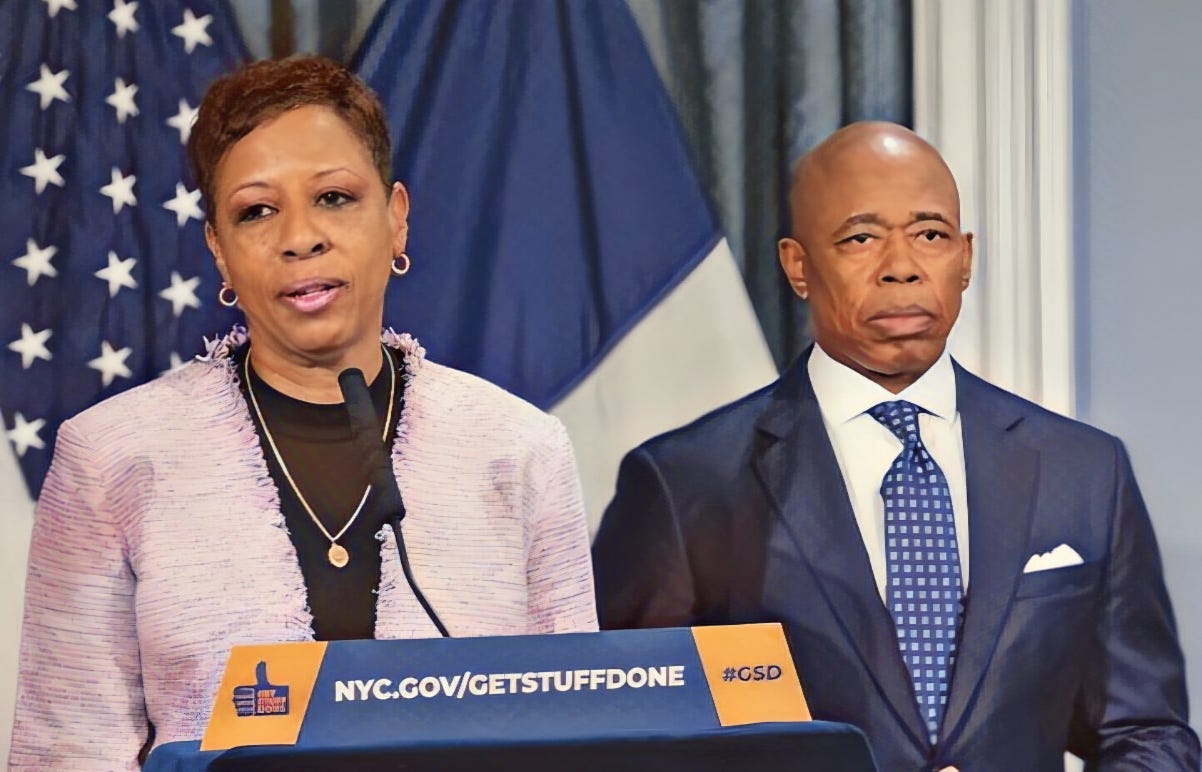
By M. Thomas Nast
In 2002, New York City faced controversy involving actor Danny Aiello and his associates in a failed plan to convert a neglected harborfront area into a movie studio. The ambitious plan to create a film hub on Staten Island’s North Shore crumbled amidst allegations of fraud, incompetence, and connections to convicted felons.
The saga, pitting the Bloomberg Administration against Aiello and his associates, left a mark on New York's efforts to maintain its cinematic allure. But the price of looking the other way was much higher.
In 2002, NYC officials under Michael Bloomberg had a moral compass. They would not allow even the appearance of impropriety to cloud the City’s book of business.
Today, under Mayor Eric Adams and Speaker Adrienne Adams, NYC officials are brazenly engaged in active and actual impropriety. A case in point is a series of recent deals in NYC Council Member Kamillah Hanks’ Staten Island District, the same one where Bloomberg’s team kiboshed Danny Aiello’s Stapleton Studios.
However, in 2024, the Adams people receive lavish patronage. This includes NYC Council Member Hanks, NYC Cultural Affairs Commissioner Laurie Cumbo, and her “Baby-Daddy,” Bobby Digi, aka “Henry Olisa,” a man with a troubled past and connections to felons and organized crime.
This article explores whether NYC Politics under the Mayor and Council Speaker has devolved into corruption far worse than even Hizzoner’s predecessor since the current Adams “Ship of Fools” sailed into City Hall after the 2021 Elections.
Eric Adams' Ship of Fools
By M. Thomas Nast - I am a politico and longtime Republican. I am using a pseudonym. The publisher knows who I am. I went to the migrant/ sanctuary city / illegal immigration protests and counter-protests this past weekend on Staten Island. The entire situation is a mess. But the matter seems to be self-created - by political “insider” leadership that, when…
The Stapleton Studios Deal
Initially endorsed by then-Mayor Rudolph Giuliani, the idea to transform Staten Island’s abandoned Navy repair facility into a bustling film studio was initially met with stark enthusiasm. Businessmen, including Aiello, aimed to transform the deserted Stapleton site into a major indoor film center.
Remember, in 2002, New York was the place to be. New York bragged about a $5-billion film industry. "Sex and the City" and "The Sopranos," the hottest television shows, used Silvercup Studios and Kaufman-Astoria Studios. Aiello’s Stapleton site was set to take a piece of the action, bringing economic activity to a stagnant corridor.
Aiello’s proposal encompassed a studio, marina, and hotel. The team, including notable figures like Bob DeMilia and Marlowe Walker, had already invested $2 million, hosting film productions like "Max and Grace."
All the pols were on board. "It would sort of be a little Hollywood East," then-City Councilman Michael McMahon optimistically noted.
The Deal's Collapse
However, the project fell apart amid accusations of fraud and mismanagement.
Michael Sherman from the city's Economic Development Corp. highlighted the group's failure to secure necessary permits, insurance, and credible financing. "They would show us different documents that were in no way what any business professional would call a proof of financing," Sherman explained.
“[The City of New York] generally do[es] not do business with people with felony convictions.”
-Michael Sherman, Communications Director, Economic Development Office of NYC Mayor Michael Bloomberg, 2002 - 2006
The death blow came when it was revealed that Marlowe Walker's son, Bob, a convicted felon involved in stock fraud, was representing himself as a partner, raising questions about the group's legitimacy and allegations of organized crime connections. "We generally do not do business with people with felony convictions," Sherman stated, underscoring the City's stance.
The City evicted Stapleton Studios, but the firm resisted and initiated a lawsuit. Aiello, emotionally affected, defended his integrity at a City Council hearing, questioning the accusations of incompetence. While a temporary restraining order allowed the company to continue operations, Paramount Pictures withdrew from a planned project.
For reasons of the appearance of impropriety, the Bloomberg Administration killed what would have been a transformative deal on Staten Island’s North Shore.
A New Era of Grift Under the Adams Administration?
Is the “NYC Does Not Do Business With Felons” policy now out the window under Mayor Eric Adams and Speaker Adrienne Adams?
Two years after Laurie Cumbo's appointment as NYC Cultural Affairs Commissioner by Mayor Eric Adams, her ties to Bobby Digi-Olisa are raising eyebrows. Digi-Olisa has a history of legal troubles, failed businesses, bankruptcies, dilapidated properties, and alleged underworld connections.
Now, similar questions about Digi-Olisa’s legitimacy and allegations of organized crime involvement have ensnared a Council Member Hanks - Commissioner Cumbo - “Community Leader” Digi-Olisa “grift scheme,” sparking a potential scandal reminiscent of the Danny Aiello studio debacle of 2002.
Laurie Cumbo's rocky tenure as a NYC Commissioner, already marred by controversy due to past insensitive remarks, sparks new embers.
“The whole thing looks like a grift scheme, and they aren’t even trying to hide it,” said a Staten Island political insider connected to City Government. “Kamillah Hanks’ grant of $100,000 in ‘cultural affairs’ money funneled to Bobby Digi’s charity through Cumbo's influence echoes some of the worst improprieties I’ve ever seen. Bloomberg walked away from these deals. De Blasio’s people did them, but they were always papered right, never over the line. These clowns are so blatant, and it’s the last thing [Adams] needs right now,” the source said under conditions of anonymity.
The source also claimed the 2018 Digi-Olisa Assembly campaign was little more than a “political wash job.” Digi-Olisa “ran to lose,” they said. “He raised all that money so the right people could get paid. Now, the pattern continues, and the grift gets bigger.”
Digi-Olisa's History of Legal and Financial Issues
In 2024, Digi-Olisa remains a contentious figure. He wrangled with city departments, creditors, and the law for many years.
Digi-Olisa previously faced allegations of landlord misconduct, including ignoring building violations and failing to pay fines. Though charges of domestic abuse against him were dismissed, his property management on Broad St., Water St., and Brook St. were criticized for numerous violations, including illegal apartments and unsafe conditions. Digi-Olisa sometimes defended these as “tenant-caused issues.” At other times, he blamed an “unnamed business partner.”
His financial history is checkered with bankruptcies and foreclosures, which Digi-Olisa attributes to a difficult divorce. He emphasizes prioritizing his children over financial matters during these times.
With at least ten arrests between 2000 and 2014 for various offenses, Digi-Olisa contends these were instances of racial profiling. Most charges were dismissed or resulted in pleas to lesser crimes, yet the details remain largely sealed, adding to the ambiguity surrounding his legal history. He was represented in many matters by criminal attorney Mark Macron.
O’Henry’s Publick House and the FBI
It appears everything Digi-Olisa touches becomes controversial. His recently failed business, O’Henry’s Publick House, closed in 2022. While he blamed the Minthorne Street locale’s failure on COVID, the reality is that the business was evicted because they didn’t pay their rent.
“The restaurant is still open, but we have been advised that they’ll be leaving by December 31,” said Staten Island Attorney Gary Angiuli.
Digi-Olisa was adamant that his business wasn’t folding. Instead, he said that he was in the process of “reimagining and relocating the business.”
“I wouldn’t call that closing,” Digi-Olisa said.
Two years later, it seems he was selling a pipe dream about his latest failed business, one he probably doesn’t want to cling to.
FBI 302s obtained from a FOIA request show that Digi-Olisa had alarming connections with alleged organized crime figures, raising questions about the integrity of his dealings.
HENRY OLISA aka BOBBY DIGI date of birth (DOB) XXXX social security number XXXX cell phone number XXXX address XXXX Staten Island, New York, was interviewed at his hime. Special Agents XXXX of the FEDERAL BUREAU OF INVESTIGATION (FBI) and XXXX of the DEPARTMENT OF COMMERCE conducted the interview. After being advised of the identities of the interviewing Agents and the nature of the interview, DIGI provided the following information:
DIGI first met XXXX in November 2017. At the time DIGI…a British-style pub…The pub, called O’HENRY’S PUBLICK HOUSE is located at 10 Minthorne Street, Staten Island and is still not open.
DIGI is the President of the STATEN ISLAND DEMOCRATIC ASSOCIATION and knows XXXX from the Democratic Party…
We contacted Digi and asked whether he would confirm the February 2018 meeting with the FBI and Department of Commerce. No response was received as of press time.
The circumstantial evidence from the FBI 302 is unquestionable. Staten Island, the Staten Island Democratic Association, and a “British Style Pub” that was “still not open” in February 2018 point directly to Digi and no one else we have become aware of in our research.
La Cosa Nostra Connection
A law enforcement source tells us that the FBI 302 was submitted on February 14, 2018, from the investigation into former Staten Island Attorney Richard Luthmann and his co-defendants, George Padula and Michael Beck. The source said that the date of the actual FBI encounter could have been as much as several months earlier, but probably not before the defendants were arrested on December 15, 2017, because the FBI would not risk a “tip-off.”
The FBI 302 was made public under a FOIA case Luthmann filed against the FBI and the Department of Justice in September 2021.
Luthmann is a contributor to this publication. He declined to comment on this article and said he didn’t want to “taint” the independent factual investigation.

In January 2018, Padula was engaged in a contentious bail hearing in Brooklyn Federal Court, represented by lawyer James R. Froccaro, who has represented numerous La Cosa Nostra figures, notably “Mob Wives” hubby Lee D’Avanzo.
A review of the case docket in United States v. Luthmann et al. confirms these timelines. U.S. Magistrate Judge Viktor V. Pohorelsky denied Padula bail in January 2018, and U.S. Judge Jack B. Weinstein denied his February bail appeal.
The FBI 302 shows a connection between Padula and Digi-Olisa. In shades of Marlowe Walker’s son and the Stapleton Studios deal, Padula’s father and uncle discussed lending and investment with Digi-Olisa, on the O’Henry’s deal.
“It’s not like [Digi-Olisa] was going to walk into TD Bank or Northfield and get a conventional business loan with his history. He was dealing with these guys,” the law enforcement source said.
But just because they weren’t conventional lenders, does that mean Digi-Olisa was dealing with shady characters?
Then-Assistant U.S. Attorney Moira Kim Penza thought so. She stated on the court record that Padula, the son of Digi-Olisa’s prospective O’Henry’s partners, had “organized crime connections…which raise a serious risk of dangerousness in light of the fact that he has purported to rely on organized crime connections to commit fraud and violence.”
Penza further said that in 2012, the prospective O’Henry’s investor’s son “was arrested after selling an AK-47 and a revolver to a cooperating witness.” Another government witness said he claimed to have “shot up” a store on Staten Island.
As far as the U.S. Government was concerned, Digi-Olisa wasn’t just doing business with felons. Digi-Olisa apparently had no problem doing business with La Cosa Nostra. With actual FBI 302s detailing these associations, his past associations overshadow his current activities.
“Charity CEO” Bobby Digi-Olisa
His most recent business failure at O’Henry’s, Digi-Olisa, wasn’t deterred. He re-deployed.
Digi-Olisa is now the CEO of the Canvas Institute for Arts and Culture. Their website says they are a non-profit entity. They appear to have an important charitable purpose:
Canvas Institute's mission is to provide a platform for the next generation of creatives, civic, community, and political leaders to collaborate through the design and implementation of solutions that respond to local needs and provide underserved communities with tools to live a health-conscious lifestyle.
The Canvas Institute says they emerged from an earlier organization named Island Voice:
Island Voice has been a prominent presence in Staten Island's business landscape since 2006, with a steadfast dedication to empowering youth and offering enriching cultural and social-emotional learning experiences. In 2016, Island Voice underwent a strategic transformation, resulting in the establishment of two distinct organizations. Canvas Institute emerged as the nonprofit entity, driven by a mission to create a platform for sharing valuable insights and mobilizing the community's efforts towards prioritizing the development and well-being of the next generation.
It looks like the Canvas Institute is doing important work. They are supported by the community and NYC elected and public officials.
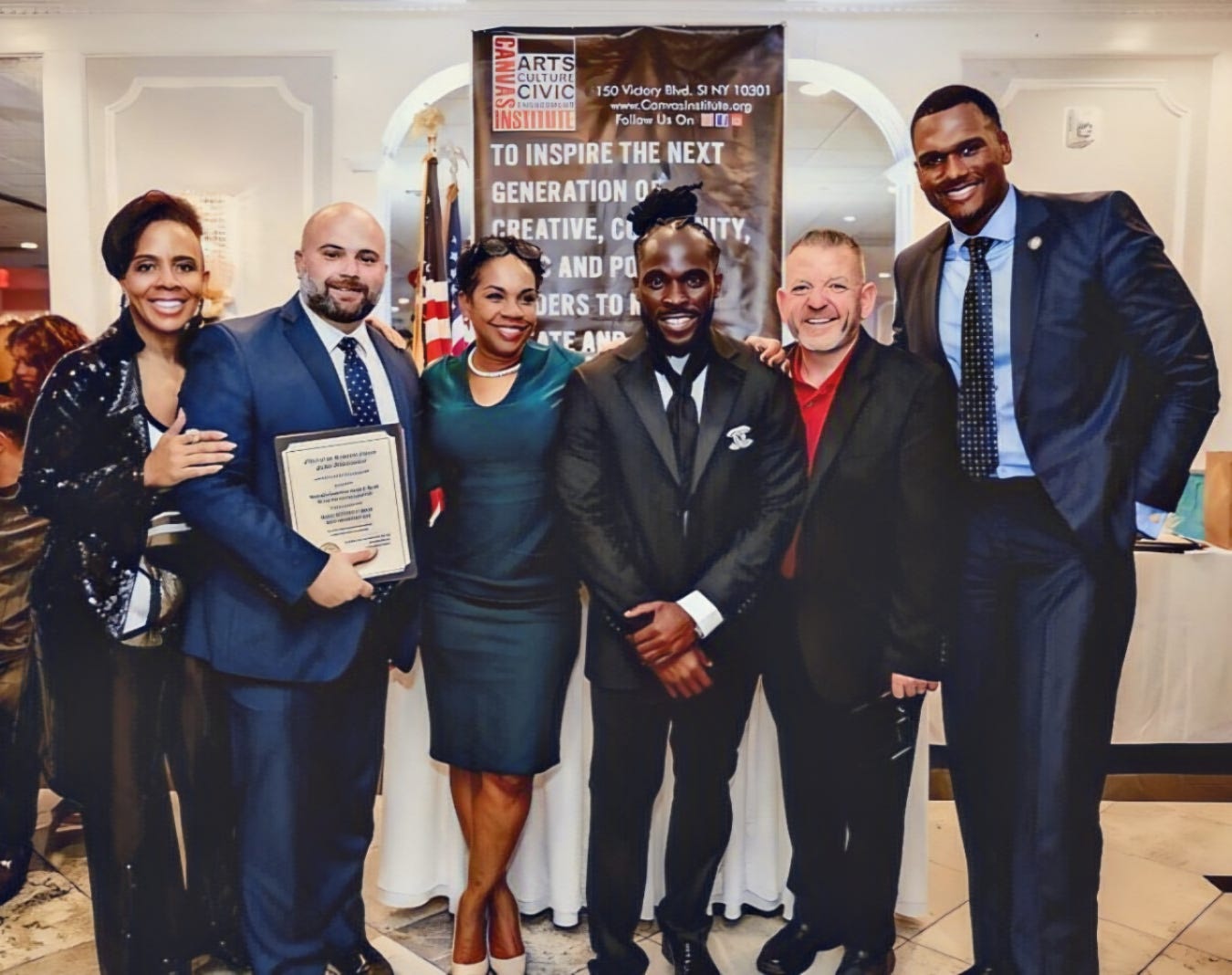
Two years after the O’Henry’s business failure, Digi-Olisa is once again the toast of the town:
Our CEO, Bobby Digi offers a program that combines Compassionate Systems tools with art and creative expression. With almost 30 years of experience in grassroots work and MIT-certified training, we provide young students with tools and practices for social-emotional learning and well-being education. Our program includes self-regulation skills and violence reduction training, among other tools that promote compassion and understanding.
Taxpayer funds support the Canvas Institute. The organization recently received $105,000 in council funds allocated by NYC Council Member Kamillah Hanks.
“I was delighted to join Bobby Digi and the CANVAS Institute family at the opening of their new hub. I admire the impactful work they do with young people in our community. Equally exciting was announcing the allocation of $105,000 in funding from the NYC Council to support their efforts in providing career readiness and mentorship,” said Hanks in a recent mailing from her office.
To this point, Digi-Olisa has received the benefit of the doubt and a free pass. But this commentator thinks that anyone who had some of the legal and financial troubles he had deserves a closer look, especially when the U.S. Government’s statements put Digi-Olisa in meetings with potential business partners from La Cosa Nostra.
Island Voice
The Canvas Institute’s website says that since 2006, Digi-Olisa has helmed a small entity called Island Voice. According to Island Voice’s LinkedIn page:
Island Voice, Inc. is a non-profit organization based on Staten Island New York. The group's mission is to act as a resource in promoting community development by facilitating solutions to effect positive and lasting change in the lives of its constituents through economic empowerment, politics, youth advocacy and cultural awareness.
Island Voice, Inc. holds itself out as a non-profit organization. So it stands to reason that Digi-Olisa would have some knowledge of how a charity works. He’s the “toast of the town” as the Canvas Institute’s CEO and has experience with non-profits for the better part of two decades.
We looked for a non-profit presence for Island Voice, Inc. but couldn’t find the organization on Guidestar or ProPublica, the industry-standard websites.
We found them using Candid and obtained their NFP “Rosetta Stone,” their EIN: 20-8287396. Island Voice, Inc. is a 501(c)(3) public charity. However, their charitable mission is listed as “Unknown or not classified.”
We went to the IRS website with the EIN Number and used their Online Search Tool for Tax Exempt Organizations. The results were surprising.
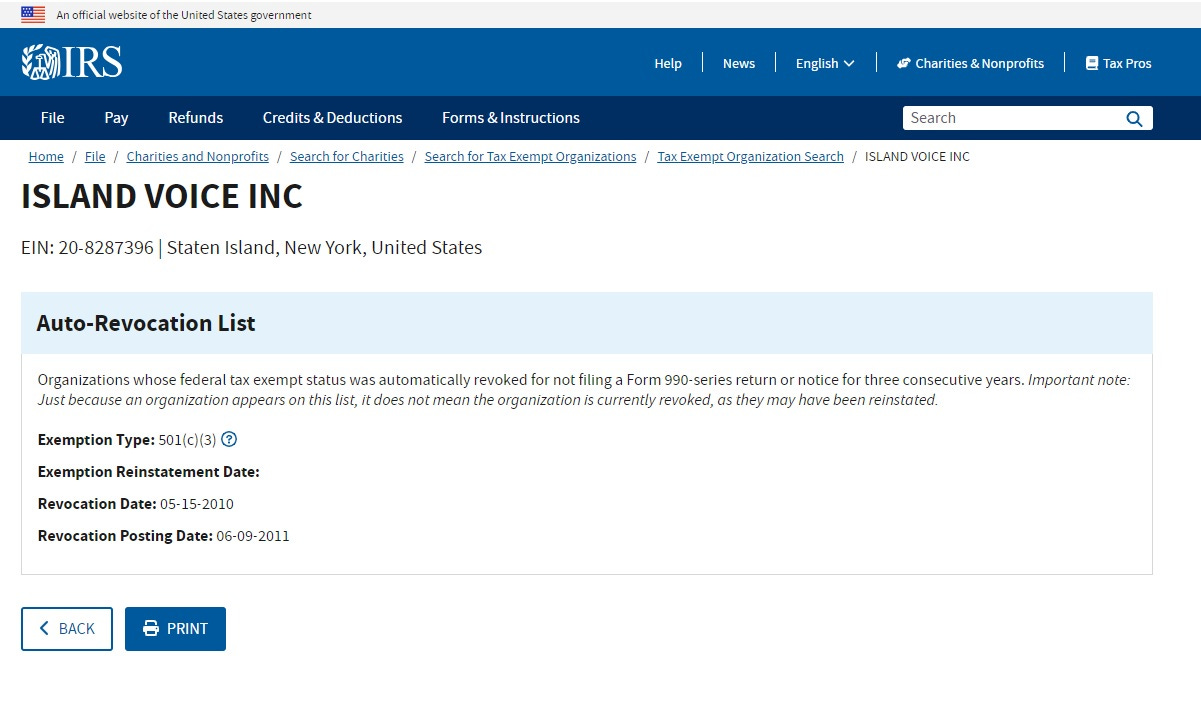
Digi-Olisa has been with Island Voice, Inc. as a charitable executive since it was formed in 2006. One of the biggest jobs of any charitable executive is compliance with state and federal regulators, meaning the IRS and the State Attorney General’s Office. Tax returns and reports must be filed with the IRS and the AG every year. These tax returns and reports are open to public inspection. Every executive in the charitable world knows this.
The tax return that goes to the IRS is a Form 990. Just like personal tax returns, Form 990s must be filed annually. Their due date is a month later than personal returns, on May 15.
The IRS’s website says Island Voice, Inc.’s charitable status was revoked in May 2010 because the organization failed to file three consecutive 990 charitable tax returns.
If Island Voice, Inc. was formed in 2006, it missed three tax returns in 2007, 2008, and 2009 and had its status revoked in 2010, that means Digi-Olisa NEVER filed a tax return for that not-for-profit entity.
That’s not a great track record. Island Voice, Inc. still holds itself out as a not-for-profit. It hasn’t been once since May 2010. That was 14 years ago.
Has Island Voice received any donations in the past 14 years? Has Digi-Olisa received any benefits from his “executive” work?
Some would say these practices are dishonest. But the City should give Digi-Olisa the benefit of the doubt with $100K+, right?
Like Danny Aiello.
The Canvas Institute for Arts and Culture
We performed a similar investigation for the Canvas Insitute. We looked on Guidestar and ProPublica for charitable presence. They are on both. Their EIN is 82-4902021. They are a 501(c)(3) non-profit under the category: Arts, Culture and Humanities / Arts, Cultural Organizations - Multipurpose. They have been tax-exempt since April 2018.
The IRS Online Search Tool for Tax Exempt Organizations gives even more information on the Canvas Institute.
The IRS website also offers Exempt Organizations Business Master Extracts. Website users can download information reported on prior 990-EZ postcards. According to the available information, the Canvas Institute had -$34,383.00 in assets on December 31, 2021, and $140,594.00 in income and revenue for 2021.
Canvas Institute’s 2022 Form 990 EZ is readily available on ProPublica, confirming the -$34,383.00 in assets on December 31, 2021, and $140,594.00 in income and revenue for 2021.
The Schedules attached to the return are also available. Schedule A, Schedule B, and Schedule O are attached. Schedule O shows supplemental information on expenses and donations and is very revealing.
Schedule O shows that from its inception in 2016 and up until December 2021, the Canvas Institute was a modest non-profit. The 2021 expenses bear this out:
Auto and Travel……………………$3,654.00
Liability Insurance………………..$ 385.00
Property Insurance……………….$3,734.00
Meals……………………………………$1,483.00
Office Expenses…………………….$1,314.00
Supplies…………………………………$1,822.00
Schedule O also shows the Canvas Institute’s 2021 Donations to the public totaled $8,761.00.
In 2022, everything changed for the Canvas Institute. The organization had not previously received any money from the NYC Government. But almost overnight, Digi-Olisa and the Canvas Institute had begun receiving City money. How much? We’ll know exactly who it is from and where it was spent on May 15, 2024, after the 990 is filed.
But what changed? Maybe Digi-Olisa was finally freed from his business obligations at O’Henry’s, and now he could devote all his time to the NFP.
Or perhaps it was something else. I wonder what?

Digi-Olisa’s Relationship With NYC Cultural Affairs Commissioner Laurie Cumbo
Bobby Digi-Olisa and Laurie Cumbo’s relationship remains controversial in New York City's political landscape. In 2022, the relationship garnered significant attention with Digi-Olisa's extravagant proposal to Cumbo at the Met Gala. The grand gesture, set against the backdrop of a $10,000-a-ticket event, raised eyebrows about how the couple afforded such luxury.

This high-profile display of affluence sparked questions, considering Digi-Olisa's troubled financial past and Cumbo's position as a critical figure in Mayor Eric Adams' administration.
The personal dynamics between Digi-Olisa and Cumbo extend beyond romance, as Digi-Olisa is the father of the NYC Cultural Affairs Commissioner's child. Mayor Adams’ appointment decision was scrutinized, given her past controversial remarks. Digi-Olisa's questionable history now adds a tinge of controversy that an already politically fragile Mayor does not need or want.
The allocation of significant public funds to his non-profit has led to calls for an audit of Digi-Olisa's and the Canvas Institute’s finances and a closer examination of the relationships between Digi-Olisa, Cumbo, Hanks, and their respective public offices.
In many ways, the entire episode is the Anti-Stapleton Studios. There, NYC Officials went out of their way to ensure that personal relationships didn’t cloud governmental responsibilities and public funds. Here, it’s not even an afterthought.
As stated by Hanks, this allocation was to support the institute's work in career readiness and mentorship for young people. However, critics have pointed out the timing and the amount of this funding as potential evidence of cronyism. Digi-Olisa’s organization didn’t get a red cent in NYC money, let alone “cultural affairs” money before Cumbo was installed in her influential city position.
Mayor Eric Adams and Speaker Adrienne Adams’ Ship of Fools
The involvement of Mayor Eric Adams and NYC Council Speaker Adrienne Adams in this tangled web complicates the matter further. Both have been criticized for a multitude of reasons. The City has an illegal migrant crisis that is front and center. It’s taxing City services and creating crime where there wasn’t before. Quality of life is down, and so are property values.
The Mayor has his own campaign finance investigation to deal with. Nearly every other week, there is a new allegation of “special favors” for foreign interests.
Can Mayor Adams and Speaker Adams afford not to distance themselves from Digi-Olisa, Cumbo, and Hanks, given the apparent patronage and cronyism triangle the three have so brazenly created? Probably not, because this situation is one of their own creation. Their reluctance to address issues head-on has only led to additional questions about their administrative ethics and priorities in the face of ongoing scandals.
No one can say whether it’s still true: “NYC Does Not Do Business With Felons.”
If the last two years are any indicator, no one is looking for a life raft. It’s full steam ahead on the Adams’ Ship of Fools.







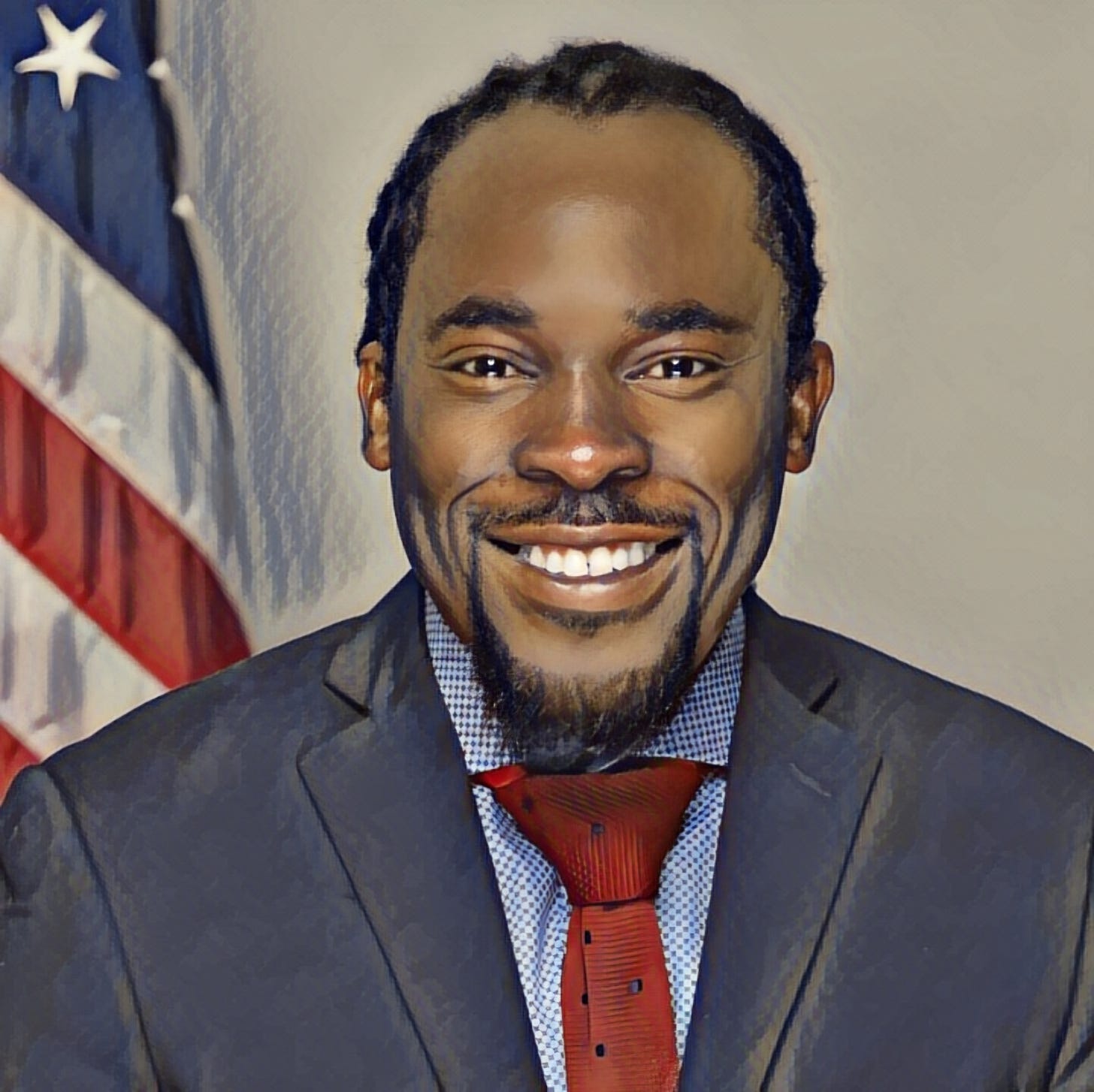
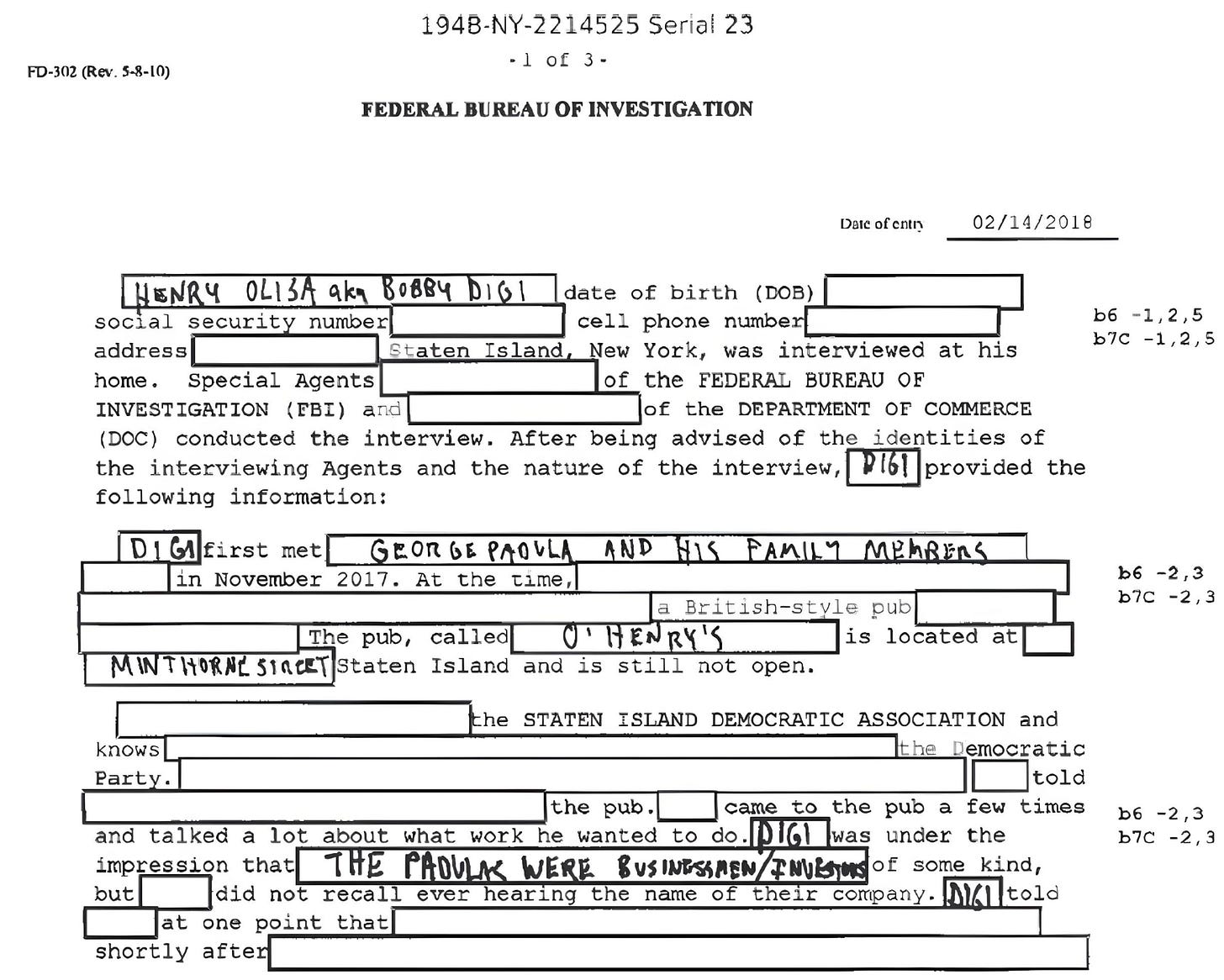

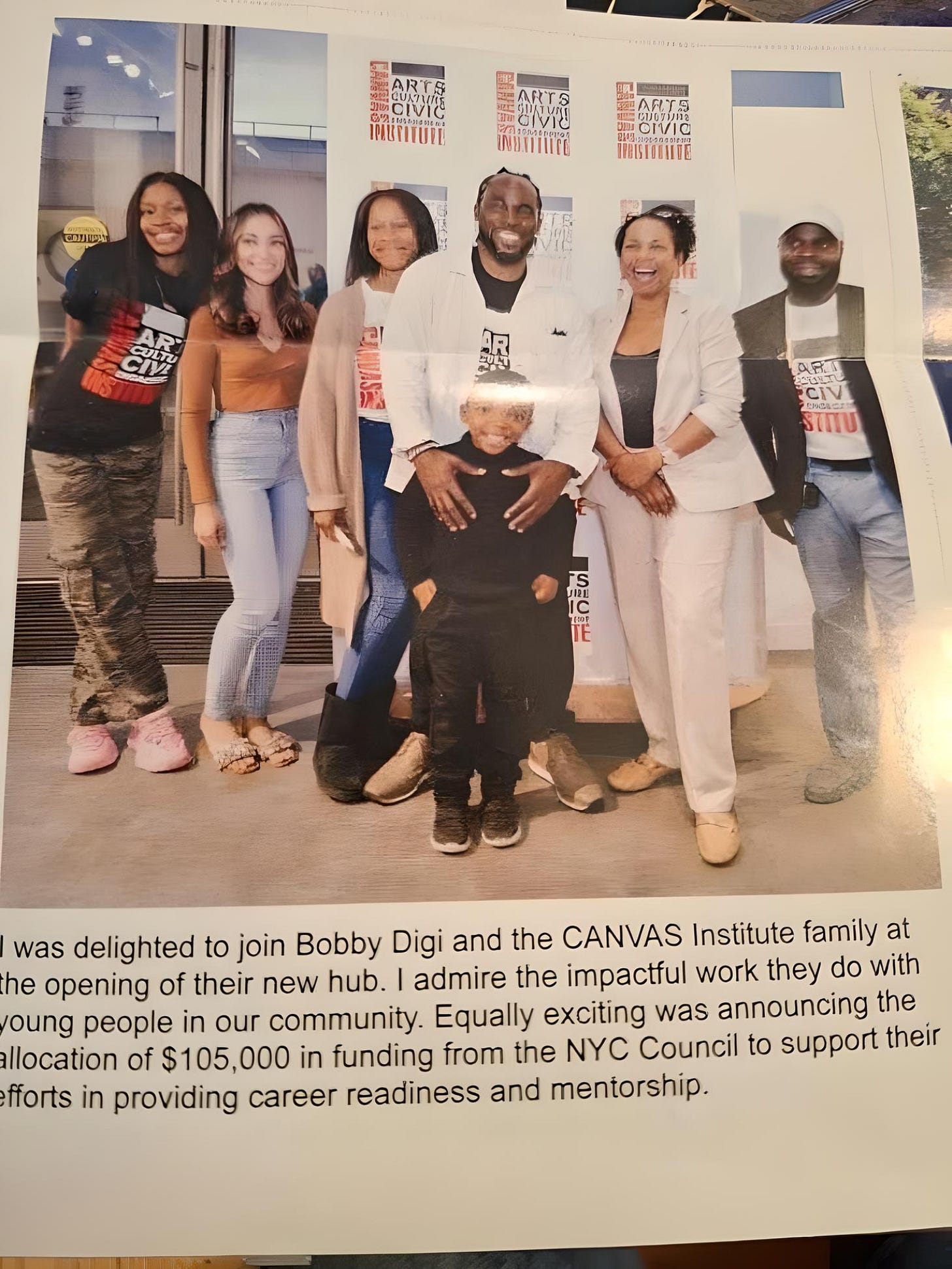




There's some more NYC Politics inside baseball that M. Thomas Nast didn't cover here because he wouldn't know. Specifically, how Bobby Digi, as President of the SI Dems Association set Kamillah Hanks up at a 2017 Primary Debate against Debi Rose at Charlie Brown's restaurant.
I know, I was there. He called on Amy Porier for the first question, which was a hit job she read off her phone. I always thought Leticia Remauro, Debi's campaign advisor, fed it to Porier. Kamillah was fucking pissed. She said, referring to Digi, "That mother fucker set me up."
I still have the Facebook posts where Digi attacked me as a Debi Rose surrogate. He said, "I ain't your nigga," or something equally moronic. They tried to paint me as racist, which is laughable, because I was really just a complete asshole.
Kamillah and Kevin hated Digi for years, and the feeling was mutual. This new connection isn't genuine. It's transactional.
The other point is that Brad Lander, if he hasn't already, probably should open up an investigation. These are all Adams loyalists. If Lander wants Gracie Mansion in 2025, an investigation of this quid pro quo with NYC Taxpayer money is a good way make Adams' rats scatter.